Content
- 1 Pea species
- 2 The best varieties of peas with photos and descriptions
- 3 Regionalized pea varieties
- 4 Conclusion
There are dozens of pea varieties - there are large, small, undersized and tall species. Before choosing seeds for planting, you need to carefully study the existing variety.
Pea species
Peas are classified according to several characteristics - according to the shape of the pods and beans, according to the ripening time and purpose. Some varieties are well suited for fresh consumption, others are used for conservation.
By the structure of the bean
According to the structure of the bean with seeds, peas are divided into two types:
- Peeling. The leaves of this variety are covered with a hard parchment layer from the inside. They are not suitable for food use, they must be thrown away.
- Sugar. Bean shells are soft, without parchment layer, have a sweet taste and are suitable for food use.
Sugar varieties are often used fresh in salads along with the outer shell.
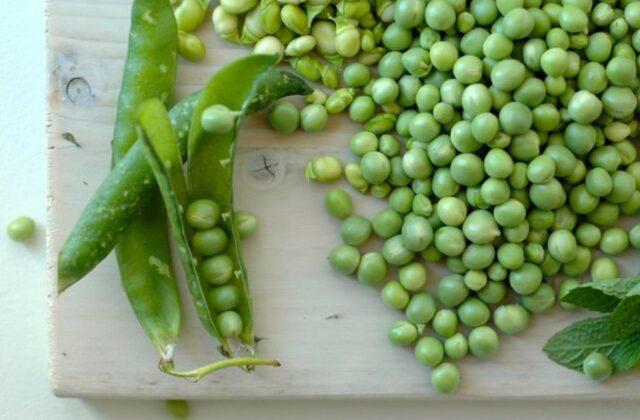
Shelling peas are mainly used for boiling and preservation.
By appointment
Sowing peas are divided into three types according to their purpose:
- canning - seeds are used unripe for harvesting for the winter;
- dining room - ripe grains are added to cold and hot dishes;
- universal - fruits are equally often consumed both fresh and dry.
By the shape of the grains
According to the shape of the seeds, peas are divided into two types:
- ordinary - with smooth round grains;
- cerebral - the seeds are angular and wrinkled after drying.
In fresh form, ordinary varieties are often used. Brain is used for boiling and preservation, since they do not crumble due to the low starch content.
By maturity
When choosing a type of crop, you need to think about how long you would like to get a harvest. Pea varieties are:
- early - seeds ripen in 1.5-2 months;
- medium - 2-2.6 months pass before harvest;
- late - seeds can ripen up to three months.
The best varieties of peas with photos and descriptions
The garden culture is very popular with breeders. There are dozens of universal and regionalized varieties of peas with photos and names.
Pea shelling varieties
Peeling varieties in comparison with sugar varieties are more keeping quality. They should be planted if pea seeds are to be harvested for the winter for long-term storage.
Dakota
Dakota shell peas mature in 55 days and produce long pods, each containing eight green seeds. The plant is about 65 cm tall.The species tolerates unfavorable weather well and gives stable yields.
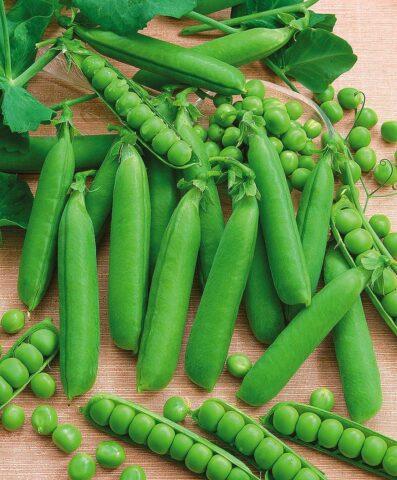
Dakota rarely suffers from powdery mildew and fusarium
Fork
The tuning fork rises up to 120 cm above the ground and produces tough, long pods with light green beans. It does not lie down and does not crumble, although it requires a garter, it ripens in medium terms. Well suited for growing in difficult climatic conditions.
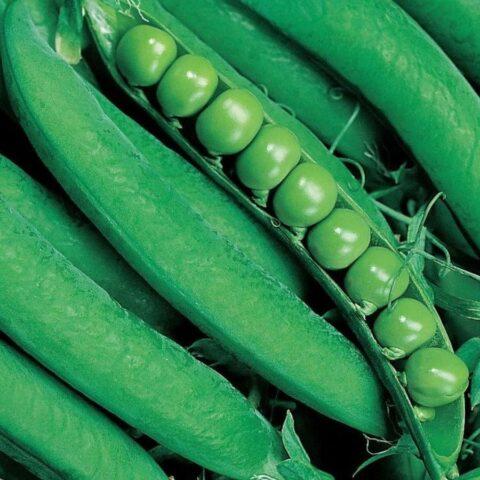
Fork species contains a lot of protein in ripe peas
Adagumsky
The mid-season variety produces rounded, dark green beans with pointed tops. It rises up to 75 cm above the ground, while the support for the variety can be omitted. Each pod contains eight medium-sized grains.
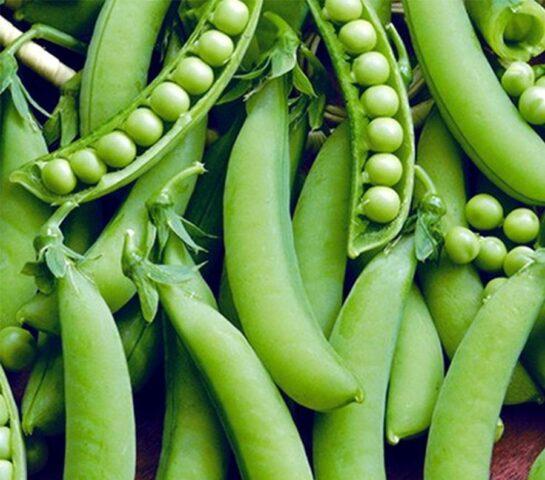
The Adagumsky variety ripens in 68 days
Brain Pea Varieties
Delicious brain peas are particularly sweet. It is grown mainly for boiling and preservation.
Harp
The delicious pea variety ripens in an average of 57 days. Gives good yields up to 700 g per square meter. The pods contain two beans and up to nine seeds in long axils. The fruit has a pleasant sweet taste and good juiciness.
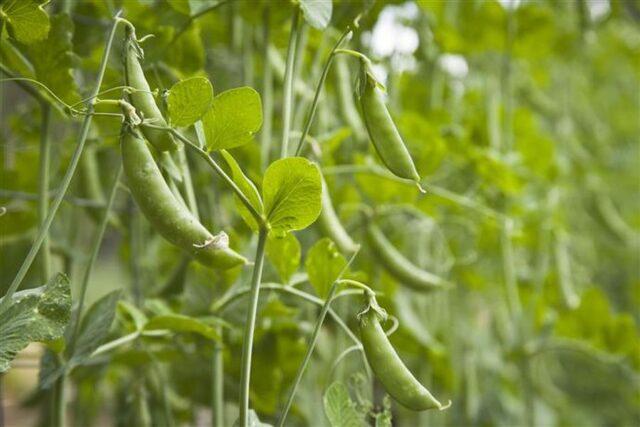
Arf species rarely suffers from fusarium and ascochitis.
Monogram
A low variety up to 70 cm gives straight beans with pointed tops, dense and juicy green peas are located inside. It takes about 60 days from germination to ripening. The variety is rarely affected by fungal ailments and has a high yield.
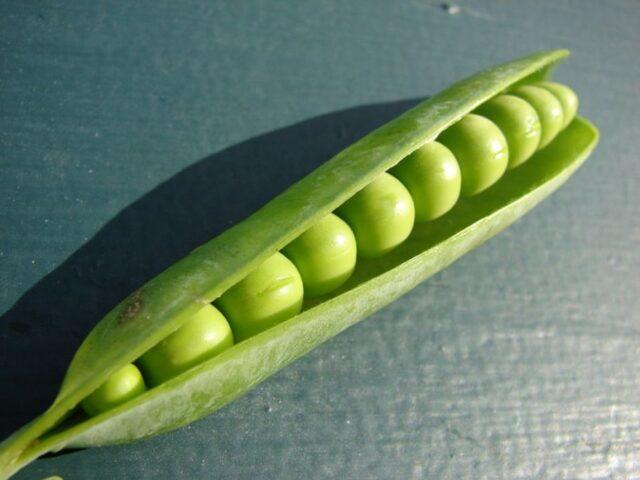
Peas Monogram is used in side dishes and soups
Voronezh green
Early peas begin to bear fruit 45 days after sprouts emerge from the soil. The seeds of the variety are large, up to 1 cm in diameter, bright green in color. They have excellent nutritional qualities and are used fresh and in preparations.
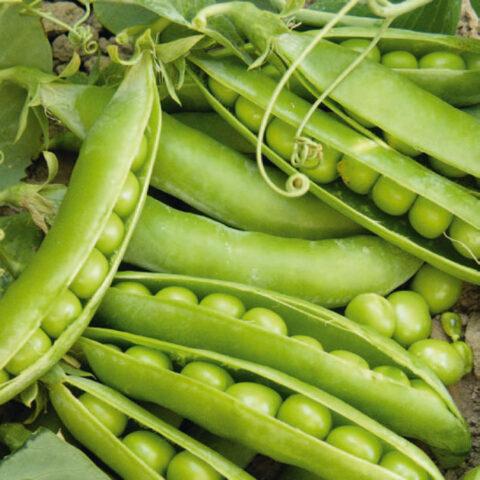
Voronezh green peas grow up to 1 m
The sweetest (sugar) pea varieties
Sweet peas are popular due to the fact that they are suitable for food consumption whole, along with the valves. It has a delicious taste and is especially often used in salads and canning.
Baby sugar
Delicious sweet peas are characterized by long, slightly curved beans with dense, round fruits. There is no parchment layer in the pods, so you can eat the whole variety. The yield is 2.5 kg per meter of planting.
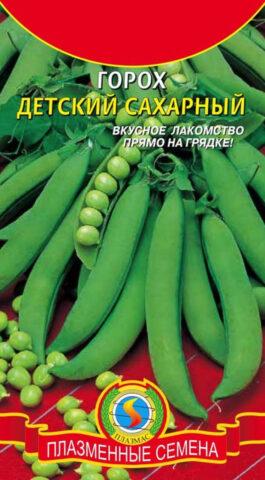
Baby sugar ripens within 1.5-2 months
Honey pod
Medium-ripening short peas yield a harvest about 55 days after germination. The beans are sweet, small, with shriveled seeds, the lower pods are located 40 cm above the ground.
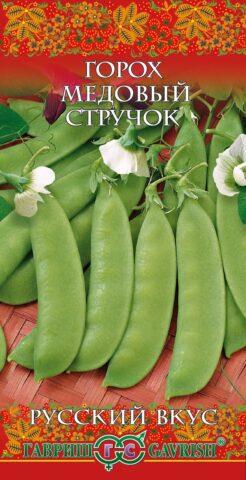
The Honey Pod variety produces modest but stable yields.
Sugar girlfriend
The medium-sized variety brings up to 1.3 kg of fruit per square meter, the pods are long with a pointed top. There is no hard layer inside, the seeds are delicate in taste and sweet. The lower beans are 70 cm above the ground.
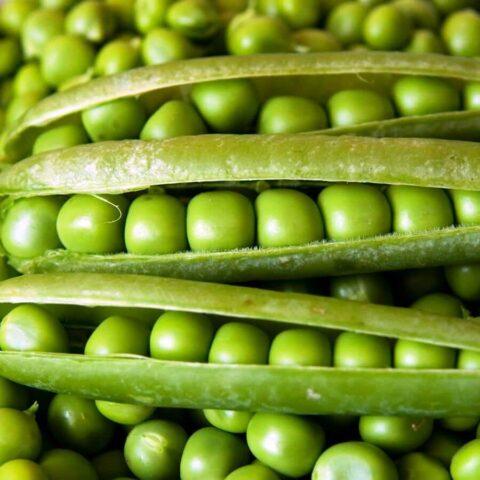
Peas Sugar Girlfriend ripens in 65 days
Low-growing pea varieties that do not require support
Growing a culture in a summer cottage is complicated by the fact that most species require the installation of trellises. However, there are varieties of peas that do not need to be tied up, they do not rise high above the ground and do not lie down even during the fruiting period.
Grandma's surprise
A peeling variety with germination in 1.5 months after the emergence of sprouts brings up to 500 g of seeds per meter of garden. The fruits are sweet and large, the beans are slightly curved and have a hard layer inside. In height, the variety rises to 65 cm.
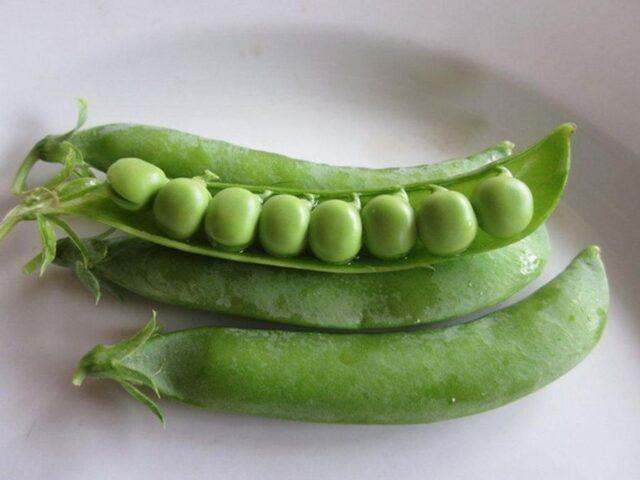
Peas Granny's surprise tolerates cold well and is suitable for northern regions
Watan
A hardy cultivar of upright peas up to 75 cm tall, it yields bountiful yields of medium-sized beans with yellowish, rounded seeds. Does not crumble, rarely suffers from diseases and pests. It has modified antennae-like leaves.
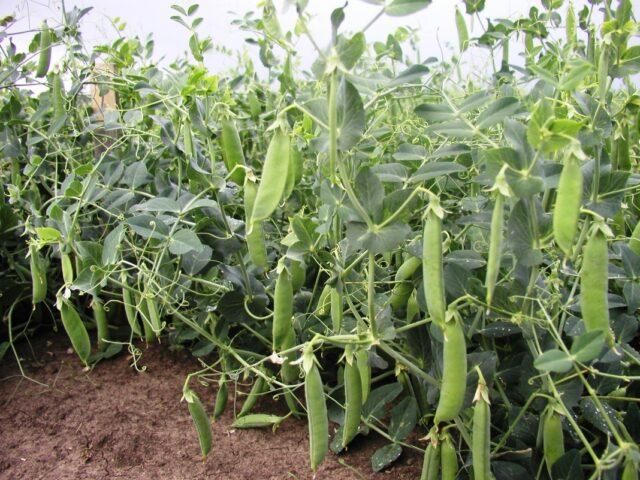
Vatan variety ripens within 70 days
Slider
Leafless Slider grows up to 70 cm and produces narrow, green fruits with large grains.Does not need support and does not lie down, is characterized by unpretentiousness. The disadvantage of the variety is a long growing season up to 7.5 weeks.
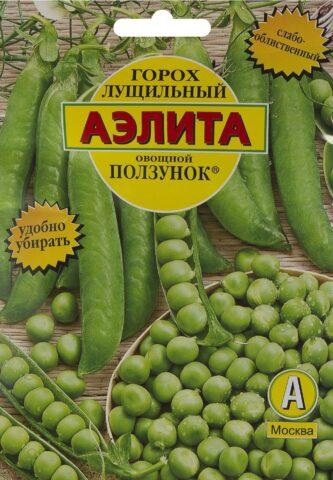
Slider variety is distinguished by sweet taste and juiciness.
Tall pea varieties
Tall varieties of culture require compulsory garter and careful maintenance. But their advantages include high yield.
Telephone
The Telephone variety yields a harvest about 100 days after sowing, with the lower beans ripening first and then the upper beans. The stem can stretch up to 2-3 m, and the length of the fruit exceeds 10 cm. The peas in the variety are large and spherical.
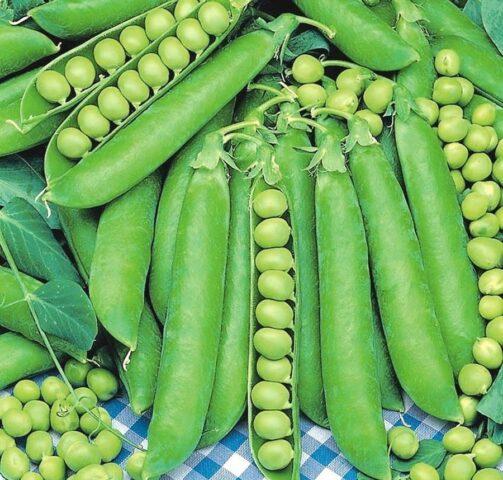
After harvesting the bottom pods, the Phone variety may form new beans
Zhegalova 112
Sugar species with technical ripeness 60 days after germination gives stable and voluminous yields. Pea beans are light green, straight up to 15 cm, stem reaches 1.8 m in height.
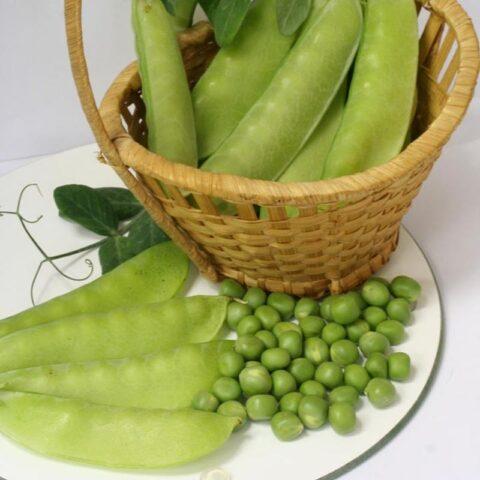
Pea Zhegalova 112 is one of the oldest - it has been grown in Russia since 1943
Russian giant
Tall peas up to 1.7 m above the ground produce dense, long beans with fleshy walls. It is considered dietary, contains a lot of protein and sugar. When grown, it requires support, brings up to 1.4 kg of yield per meter of garden.
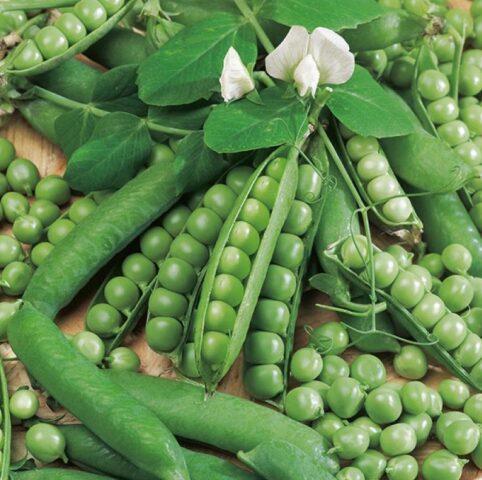
Russian giant matures in 1.5 months
Large varieties of peas
Varieties with large seeds are particularly juicy. When caring for such varieties, you need to pay attention to watering - with a lack of moisture, the beans become smaller.
Prelado
A pea cultivar with ripening for 90 days yields large pods up to 10 cm. It withstands hot weather well, but requires regular watering. Resistant to fungal diseases, it is characterized by increased sweetness and productivity.
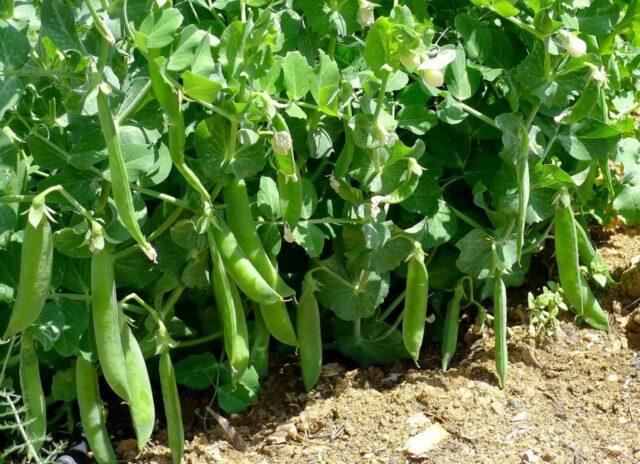
The stem of Prelado peas grows up to 65 cm
Gribovsky 11
Early peas of the shelling type have been known in culture since 1964. The stem of the variety is short, up to 40 cm, the beans are straight or slightly curved, dark green in color, up to 10 cm in length. You can eat pea fruits preserved and fresh.
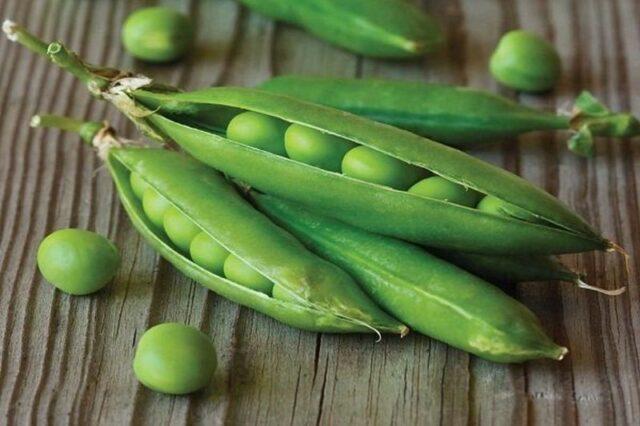
Gribovsky 11 matures in 54 days
Russian size F1
The variety produces peas up to 1 cm in diameter with a sweet and delicate dessert flavor. Differs in good frost resistance and is suitable for sowing in the ground in early spring. It develops quickly, needs props and high-quality irrigation. Reacts positively to feeding with phosphorus and potassium.
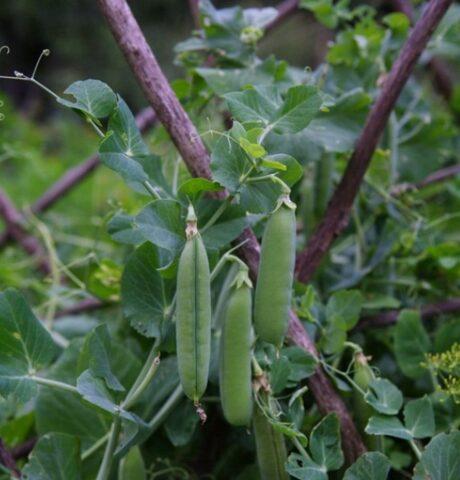
Peas Russian size stretches up to 90 cm
Early varieties of peas for open ground
Early maturing species allow you to get a harvest in 1.5 months after germination. In taste, such varieties are not inferior to the late ones and are distinguished by good juiciness and sweetness.
Aria
One of the ultra-early varieties ripens in 52 days and produces straight beans with 6-9 peas in one pod. Differs in increased demand for watering, but it tolerates cold snaps well and does not freeze when planting in spring.
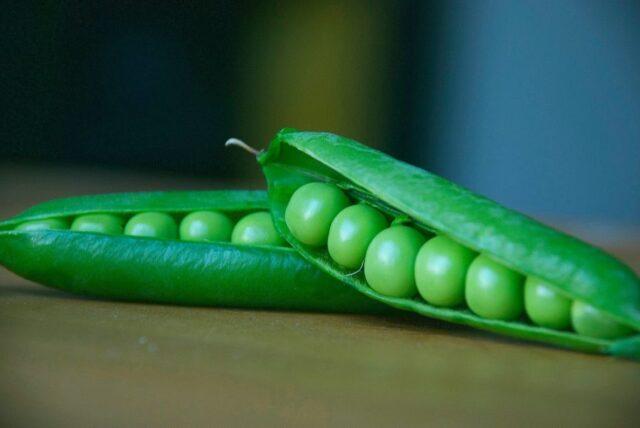
The Aria species is recommended for cultivation in the southern regions.
Virtush
The early variety reaches maturity in an average of 47 days and bears juicy and sweet fruits. The disadvantages include an unstable yield. From a meter of planting, you can collect 300-600 g of seeds, depending on the weather and growing conditions.
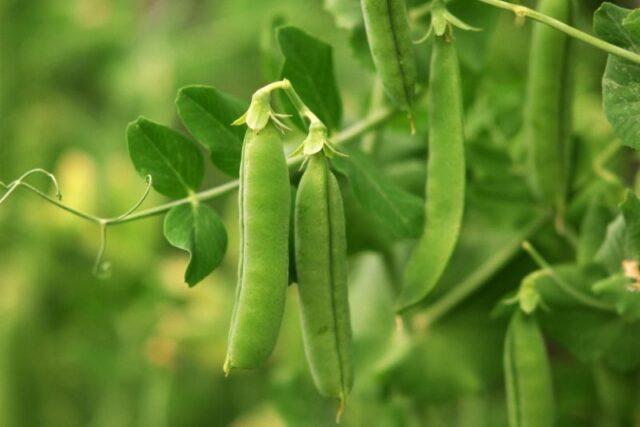
Virtush species is resistant to fusarium
Pretty boy
The early variety ripens in about 50 days, but cannot please with stability, yields are both large and very poor. The pea beans are long, with 5-7 peas, the taste is pleasant or dessert depending on the conditions.
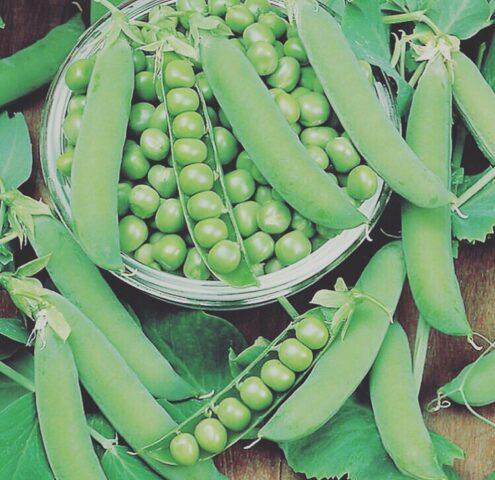
Handsome pea seeds ripen at the same time
High-yielding peas
High-yielding species are of particular interest to those who grow crops on a large scale for sale. When choosing a variety, you need to look not only at the volume of fruiting, but also at the regularity.
Oscar
The mid-season species matures within 65 days and gives curved pods up to 12 cm.Rarely suffers from fungi, although it can be affected by fusarium. The average yield is about 900 g per square meter, but with good seed care, more seeds can be obtained.
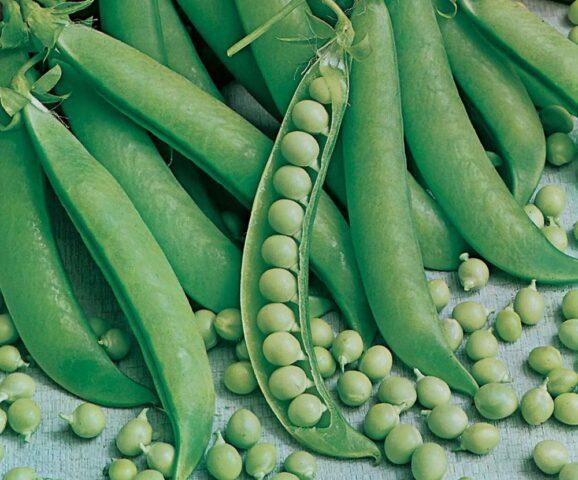
Oscar reaches 80 cm in height and needs to be tied
Alpha
Yielding peas up to 55 cm in height have a good sweet taste and are suitable for salads and long-term storage. Recommended for growing in Altai and Kamchatka, gives up to 2.8 kg of fruits per meter of garden with good care. Ripening of pods is simultaneous.
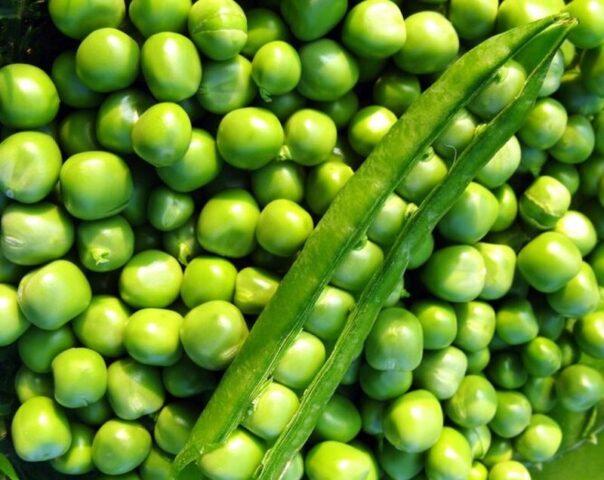
Alpha peas reach ripeness in an average of 53 days
Miracle of Calvedon
Sugar pea variety with large dark green pods tolerates cold well and does not lodge during cultivation. The fruits are large, high in protein. The plant branches slightly and stretches up to 55 cm.
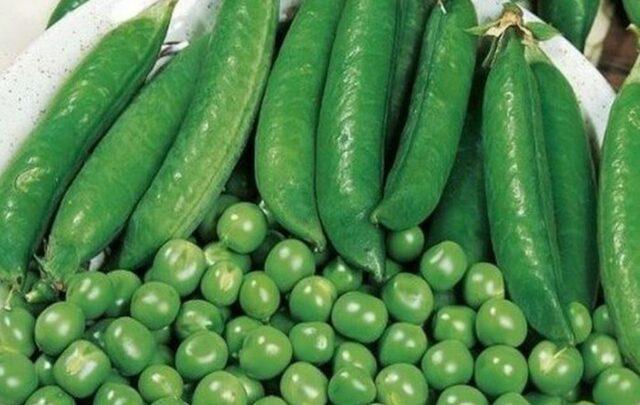
Ripening of the Miracle Kelvedona variety takes up to 75 days
Regionalized pea varieties
When choosing a variety, you need to pay attention to the degree of its hardiness and climate requirements. Peas that can grow in the middle lane do not always take root well in the northern regions.
The best pea varieties for Siberia
In Siberia, medium-sized varieties with high cold resistance develop and bear fruit best of all. Peas should also tolerate moisture deficiency and summer heat well.
Varangian
Zoned for Western Siberia and Altai, the variety reaches 1 m in height and requires a garter. Does not crumble or lodge in drought conditions, but may suffer from ascochitis. Reaches maturity in 80 days, yields ovoid smooth seeds, 4-7 in one pod.
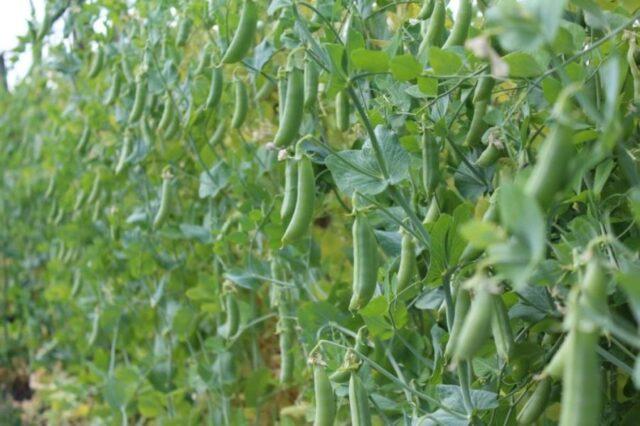
In Varyag peas, the protein content reaches 30%
Yakhont
A mustachioed pea variety with straight pods and round seeds can grow in Western and Eastern Siberia. It has an average yield, ripens in about 100 days. It tolerates drought well and does not crumble.
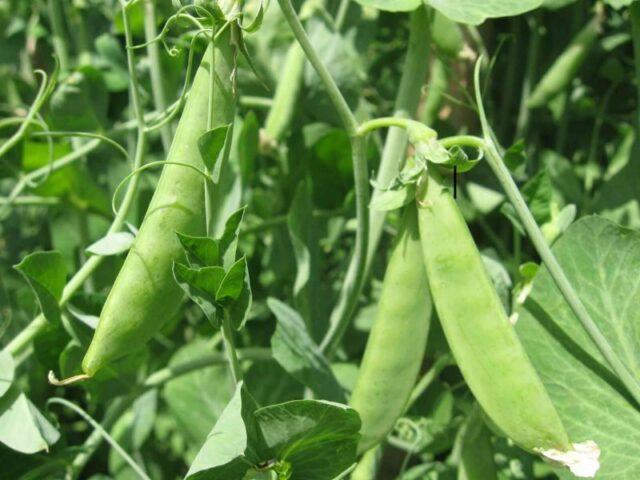
Yakhont variety grows up to 1 m
Pearl
Frost-resistant peas for Eastern Siberia and the Krasnoyarsk Territory are resistant to lodging, do not crumble and rarely suffer from drought. Produces slightly curved pods with spherical seeds. Ripens on average, in about three months.
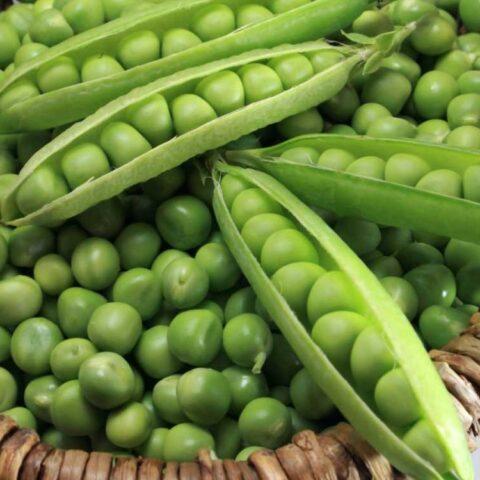
Pearl cultivar reaches 104 cm above the ground
The best pea varieties for the Leningrad region
In the Leningrad Region, varieties with resistance to cold weather, lack of sunlight and moist soils are developing well. In order for the culture to give bountiful harvests, you need to pay attention to feeding and regularly check the plantings for the presence of fungal infections.
Ambrosia
The variety becomes suitable for harvesting 50 days after germination. The pods are large, juicy and sweet, suitable for salads, snacks and preparations. A meter of planting in good conditions gives up to 600 g of fruit.
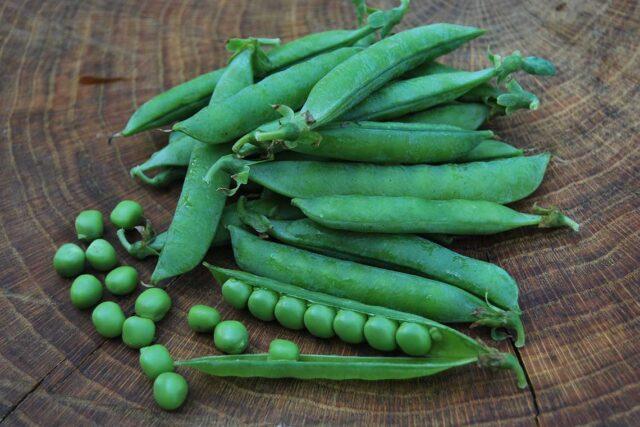
The Ambrosia variety rises up to 70 cm and requires support
Maisky 13
Vegetable peas with straight pods and round seeds develop within 60 days. Rarely suffers from fungi and tolerates night frosts well, beans ripening at the same time.
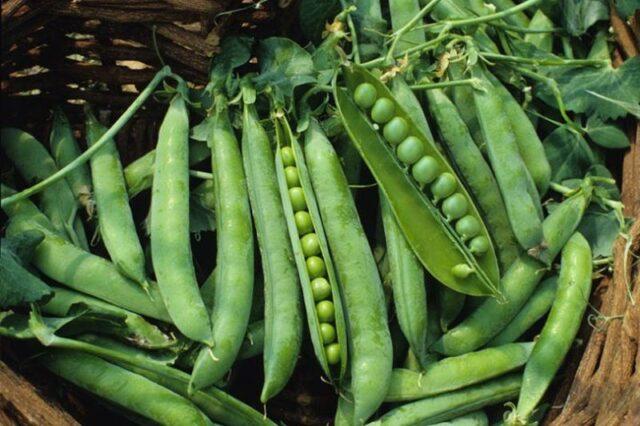
Peas Maisky 13 needs a garter or supports, as they can lie on the ground
Henry
A variety of peas for planting in the Leningrad region allows you to harvest the first crop on average 40 days after germination. It ripens unevenly, so the pods are torn off in several stages. The beans of the variety are light, up to 8 cm long.
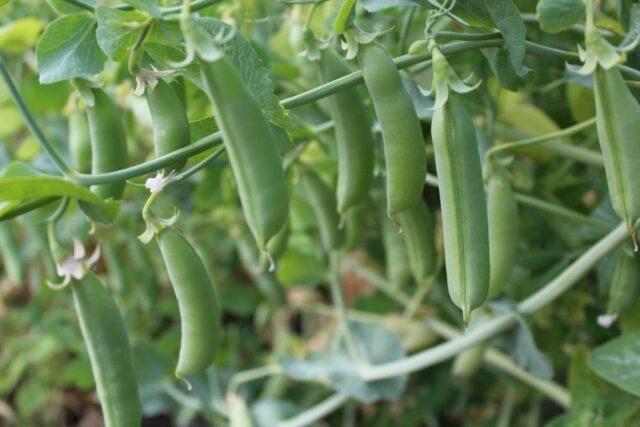
The Henry pea variety can be harvested already at the stage of technical maturity.
Pea varieties for the Moscow region
In the Moscow region, almost all varieties are developing well, with the exception of the most thermophilic ones. Cold-resistant species that do not suffer from late spring frosts are especially recommended for planting.
Gloriosa
Shell peas up to 70 cm tall with saber-shaped pointed beans develop about 55 days to technical ripeness. Has a sweet juicy taste, rarely gets sick with fusarium and ascochitis. Ripening of pods is amicable, the yield indicator is up to 1.5 kg per meter of soil.
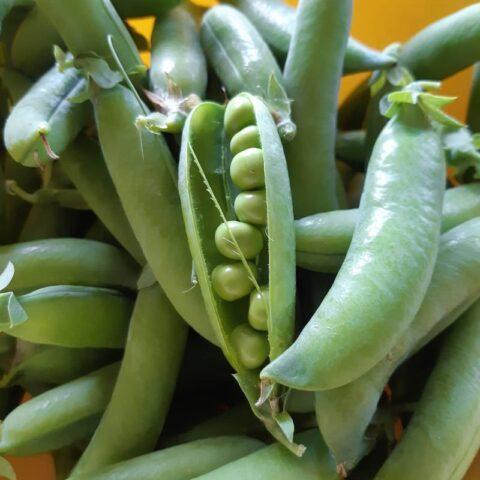
Gloriosa peas prefer sunny areas of the garden
Children's joy
Medium-branched bush pea cultivar up to 60 cm tall with dark green large fruits bears fruit abundantly and at the same time. Suitable for freezing and canning, as well as for adding to salads immediately after harvest. It has good nutritional value and contains a lot of protein.
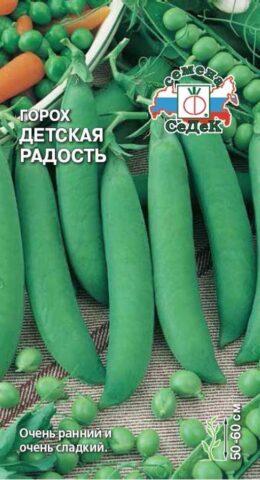
You can collect peas Children's joy two months after germination
Znayka
The variety is zoned for the Central Region and the Moscow Region. The ripening period is early, the stem is medium in length up to 70 cm, the pods are straight, dark in color. The fruit has a pleasant taste, the seeds are brain-type, green in color.
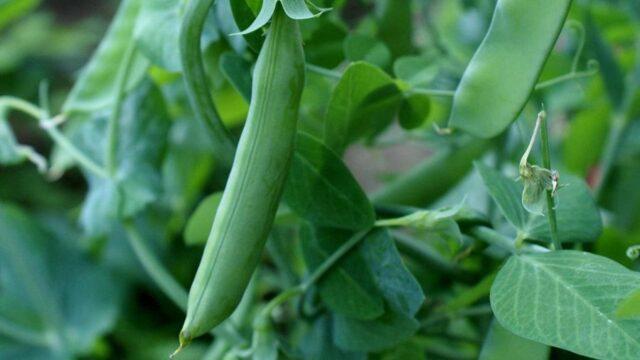
The lower beans of the Zaznayka variety ripen 40 cm from the ground
Conclusion
Pea varieties are presented in a large number of varieties. From the existing variety, you can choose species for the northern and southern regions of the country, for early and late harvest. Most varieties do not require complex maintenance and thrive with regular watering.








